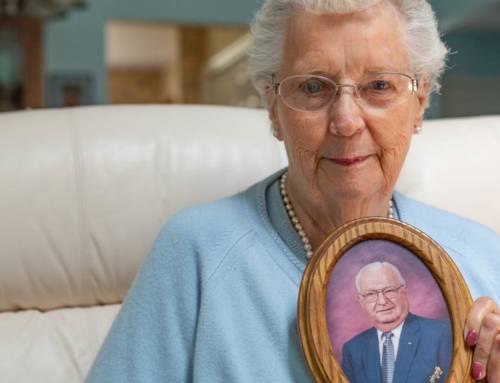
About the Author: Sunday Sermons from Sell Chapel are written by Rev. Preston Van Deursen, Director of Pastoral Care at the Masonic Village at Elizabethtown.
There’s a story going around about two women of a certain hair color who stopped at a service station on the coast of Texas and asked where the lighthouses were located.
The service station attendant was a little confused and asked if there was any particular reason they were looking for lighthouses. One of them said, “We understand lighthouses have good paying jobs. There are lots of ads in the paper for them, but we don’t know where they are located so we can apply.”
The service station attendant said, “As far as I know there are no lighthouses in Texas. Let me see that newspaper.”
Sure enough, there were the ads which read, “Light housekeeping needed. Apply in person.”
I know that’s bad, but when you write a newspaper ad, you might consider that all kinds of people will be reading it, and therefore, all kinds of misunderstandings can take place.
By the way, why are there so many blondes in L.A.? It’s easier to spell.
Communication is a wonderful thing, but it is also tricky. Every pastor is aware that what he or she says is not necessarily what people hear. If you’re offended by blonde jokes, for example, you may not hear anything else I have to say today.
The act of communication has at least three critical elements the sender, the message and the person who receives the message. I say “at least three elements” because there may be many more factors involved in successful communication. For example, the relationship between the sender and the receiver. Some married couples, I understand, can finish one another’s sentences.
Communication can also be affected by whether the sender and the receiver share the same experiences. One man said he took his family to one of those restaurants where the walls are plastered with movie memorabilia. He went to see the hostess about reserving a table. When he returned, he found his 11 year old daughter staring at a poster of Superman standing in a phone booth. She looked puzzled.
“Doesn’t she know who Superman is?” he whispered to his wife.
“Worse than that,” she replied. “She doesn’t know what a phone booth is.”
Communication between generations can suffer because of a lack of shared experiences.
Many factors can affect whether an act of communication is successful.
Jesus told a parable. A farmer went out to sow seed. Some of the seed fell by the wayside and the birds devoured it.
Some of the seed fell on hard ground and withered because the young plants could not put down deep roots. Some of the seed fell among thorns and the thorns grew up and choked the young plants. But some of the seed fell on good ground and brought forth fruit in some cases a hundredfold.
Jesus was talking about a particular act of communication. That act of communication was his teaching about the kingdom of God. Some people are exposed to Christ’s teachings and they only half-listen. The message really doesn’t take. It is as if birds had devoured it before they had a chance to process it. There are others who seem to listen to Jesus, but really they are indifferent or even hostile. The message never has a chance. They are hard ground. There are still others who are interested, but they are burdened with other concerns, and soon those other concerns choke out the message of the kingdom and they are no better off than the others. But, then there are some whom Christ calls, “good soil.” These are people who hear, who respond, and who live out the kingdom the best they are able with God’s help. I hope most of you count yourself as good soil. You hear the message of the kingdom, you respond eagerly to its call, and you live out the kingdom life the best you are able with God’s help.
You have to wonder, though, where Christ is leading with this parable. No wonder his disciples were confused and asked for clarification. He’s saying that some people will respond to the Gospel and others will not. What are we supposed to do with this information? Perhaps he was preparing his disciples for the kind of response they would receive when they began communicating the Gospel.
COMMUNICATING THE GOSPEL OF CHRIST IS AN IMPORTANT PART OF BEING A FOLLOWER OF CHRIST. We know that’s true. We are not only “good soil” but once the Gospel is sown in our lives, we are to join with Christ in sowing the seeds of the kingdom in the lives of others as well. Jesus told us to go out and “make disciples of all nations, baptizing them in the name of the Father and of the Son and of the Holy Spirit, and teaching them to obey everything
[Christ has] commanded [us]” (Matthew 28:19-20). This is the Great Commission. It is the task of every follower of Jesus. We are to communicate the Gospel.
This takes many forms. For example, we communicate the faith to our children. That is probably the area most of us take most seriously. Through our gifts to the church we also spread the Gospel to the world. But we know Christ calls us to do more. Through our actions, Christ calls us to spread the Gospel to our friends and neighbors and co-workers. But more than that. Christ calls us to give a verbal witness to the people around us. This can be a scary proposition.
Some of you may be familiar with books by the English author Jill Briscoe. In one of those books she tells about coming to know Christ as a young student at Cambridge. It was a profound experience that she knew she would need to share with her friends at home. She also knew what their response would be. Pious religious people grated on her friends’ nerves. Jill knew that because that is the way she had always felt herself. She and her friends had even ridiculed a girl at school who had gone to some religious camp and come home “born again,” something that sounded weird to all of them. So she knew what sort of treatment lay ahead of her as she headed home at the end of the semester.
She decided to act promptly before she had a chance to get cold feet. She mailed invitations to her six closest friends inviting them to come to her house on Saturday night so she could share some very exciting news with them. They all arrived with neatly wrapped gifts in their hands. To her dismay she realized that they had surmised she had gotten engaged! “Well,” asked her best friend expectantly, “who’s the lucky man?” “You didn’t let the grass grow under your feet,” another of the girls murmured admiringly. “When’s the wedding?” a third friend inquired.
“Hey,” Jill interrupted. “This is probably going to grate on you pretty badly, but . . . it isn’t a man. Well, what I mean is I did fall in love well, not really in love as ‘in love’ . . . but . . . I’ve come to know and love Jesus Christ!”
Jill Briscoe says there was a shocked silence as her girlfriends stood around her, their presents clutched in their hands, their eyes as big as saucers, and their jaws sagging! “What?” they echoed, almost in unison. Stumbling and bumbling, Jill tried to tell them the little she knew in the best way she could. She says she was super-conscious that they were getting more and more uncomfortable. She could see that her words were indeed grating on them. Soon after, they left. They simply couldn’t take it, and that night she lost most of her lifetime friends. One of them actually turned very hostile. Her friends couldn’t accept her story. Only one of them stuck by her and eventually came to know Christ herself whereupon she threw a party to tell the rest of her group what had happened to her and found herself ostracized like Jill had been. “Knowing Jesus and making him known has a heavy price attached to it,” says Jill Briscoe, “but a price infinitely worth paying.” (1)
Jill Briscoe discovered the truth of Christ’s parable of the sower: Some people are exposed to Christ’s teachings and they only half-listen. The message really doesn’t take. There are others who hear the message and they are totally indifferent or even hostile. The message really never has a chance. There are still others who are interested, but they are burdened with other concerns, and soon those other concerns choke out the message of the kingdom. Only a few turn out like Jill’s one friend who proved to be “good soil.” Communicating the Gospel is part of what it means to be a follower of Jesus.
Here’s the really scary part. SOMETIMES WE CAN BE THE REASON THE MESSAGE DOES NOT GET THROUGH. We said there are at least three elements to an act of communication: the sender, the receiver, and the message. But there is also the medium by which the message is conveyed. In this case, the medium is a person us.
“The medium is the message,” said communication guru Marshall McLuhan many years ago. That’s disturbing when we are the medium by which the message is communicated.
Dick Sheppard was a very popular British pastor, famed for his preaching as the Dean of Canterbury. He says that when he was a student at Oxford, he was thinking of entering the ministry but nearly abandoned the whole idea. Why? Because he saw a bishop lose his temper at a game of tennis. (2) This one event nearly turned him against the idea of ministry as a vocation.
Well, bishops are human beings. Sometimes even bishops lose their temper. Even the best of people can’t be on their guard every moment of every day, but we all know that sometimes the message of Christ does not get through because of the person entrusted with conveying it.
The most famous example of that, of course, was Mahatma Gandhi. In his autobiography Gandhi tells that during his early days in South Africa he inquired into Christianity. He attended a certain church in Pretoria for several Sundays, but, he writes, “the congregation did not strike [him] as being particularly religious; they were not an assembly of devout souls, but appeared rather to be worldly-minded people going to church for recreation and in conformity to custom.” He therefore con¬cluded that there was nothing in Christianity which he did not already possess. Gandhi was driven away from Christianity by the fact that the per¬formance of Christians he met fell far short of their profession of faith. (3)
Sometimes the seed of the Gospel falls on hard soil, sometimes it falls among thorns. But sometimes it does not take root because of the imperfect character of the one doing the sowing.
THE BEST WAY TO SHARE THE GOOD NEWS OF THE GOSPEL IS WITH LOVE. As every sales person knows, “Nobody cares how much you know until they know how much you care.”
In Jesus’ parable of the sower, the sower is God. That is why Jesus is not worried about the character of the Sender. In his parable, the Sender is perfect. So is the message. All the burden is upon the receiver to respond. That is us. May I say, if you are among those who have provided hard ground to the Gospel message, if you are one of those who has let the cares of this world choke out the message that God is trying to lay on your heart, I hope you understand that ultimately the responsibility is upon you to provide “good soil.” Only for so long can you blame the poor efforts of the person in the pulpit or the so-called hypocrites in the church. Sooner or later you are going to have to answer for yourself if the Gospel is for you.
However, when it comes to our responsibility to share the Gospel with others, that is a different matter. You and I are not God. Our character and our actions can affect how the message is received. Here is what we must do we must in all ways communicate to others our love for them. Whether it is communicating our faith to our children or to our friends or to complete strangers. We must always sow our seed in love. They will forgive us our imperfections if they know we love them.
Writer Bruce Larson notes that “when we turn people off in our communications, it is usually because of our lack of [what he calls] ‘relatability’ rather than because of the message we bring. (4) I believe he’s right. I further have observed that people who try to witness for Christ, but who are not loving, do more harm than good. Pious, religious people who do not know how to love grate on my nerves just as they grated on Jill Briscoe’s friends’ nerves. The reason is that they do not come across as authentic, and if it is not authentic, then we want nothing to do with it.
Bruce Larson tells about a young African woman who came to the U.S. from Angola. Her name was Maria and she was always laughing. One day she went to a meeting on evangelism in her church where they were talking about pamphlets, missions, campaigns, and all the rest.
At one point someone turned to Maria and said, “What do they do in your church in Angola, Maria?”
“In my church,” said Maria, after a moment’s thought, “we don’t give pamphlets to people or have missions. We just send one or two Christian families to live in a village. And when people see what Christians are like, then they want to be Christians themselves.” (5)
Somehow I believe that is the best way of all to sow the seed of the Gospel. It is the way of love. The best type of sower is the person who loves God and who loves others. The light of Christ shines though their lives. They are “good soil.” They respond to the Gospel, then they share that Gospel with others. Of such is the kingdom of God.




